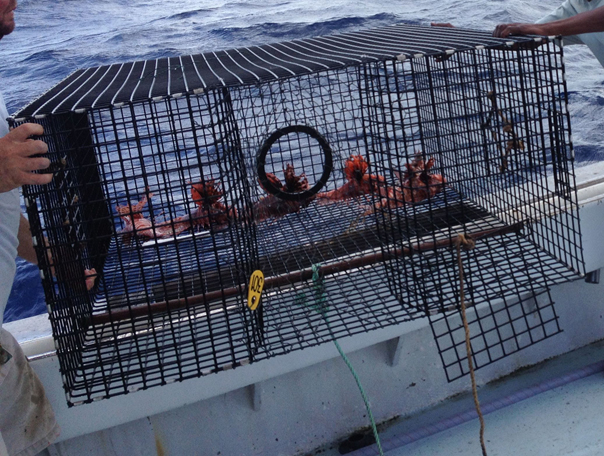Fishermen Using Experimental Lionfish Traps
The Department of Environment and Natural Resources is advising the public that several commercial fishermen will be using “experimental lionfish traps” this summer, and said boaters are asked to be careful to avoid these traps.
Currently, traps are located east of St. David’s Head in approximately 25-28 fathoms [150-168ft] of water; however, traps will also be placed in other areas of the Bermuda Platform – South Shore, Southwest, East and North. Traps will be identified with flag buoys similar to those used on lobster traps.
“The threats that lionfish pose to Bermuda’s reef system are real,” said Dr. Tammy Trott, Senior Marine Resources Officer for the Department of Environment and Natural Resources.
“The experimental trapping programme has been implemented in an attempt to increase the harvest of this invasive species. Commercial fishermen have been catching lionfish in their traps as bycatch since 2003. However, the traps are usually only set in deeper waters from September to the end of November.
“As research has shown that lionfish are in deeper waters in the summer also, the trappers will hopefully be able to remove numbers of lionfish from the reefs during this period. This will complement the volunteer culling programme that helps control lionfish in the shallows, particularly during the winter time.”
Lionfish Trap with lionfish catch, photo by Paul Van Pelt
The lionfish traps are similar in design to lobster traps and have a fixed funnel so that large fish like groupers cannot get into the traps. They also have escape slots that allow smaller fish to get out but keep the lionfish in.
Fishermen will be baiting the lionfish traps differently from lobster traps in order to keep the lobster catch to a minimum during the breeding season. The fishermen have strict terms and conditions attached to their lionfish trapping licences, which require the immediate release of any lobsters caught, and observers will be present on most of the fishing trips.
Dr. Trott continued, “As the trapping programme is still experimental, the fishing trips will be subsidized with money raised through the Bermuda Lionfish Taskforce [a collaborative effort between Government, NGOs, and concerned citizens], which includes a very generous donation from local hardware store Gorham’s Limited.”
The Minister of Environment, Cole Simons, said, “The Government is committed to supporting this critical element of our marine protection and we will continue our efforts to reduce numbers of invasive lionfish in Bermuda’s waters.”
“We need as much help as possible to meet this threat head on, we need to slow them down.” said Minister Simons.
“I am very grateful to the Bermuda Lionfish Taskforce for their continued efforts. They are integral in our fight against the lion fish and protecting our marine environment.”
For more information on the experimental lionfish trapping programme, the public is invited to contact the Marine Management Section at 293-5600 or fisheries@gov.bm. The public is also encouraged to learn more about the work of the Lionfish Taskforce at www.lionfish.bm.
Read More About
Category: All, Environment, News




The intention is a good one and I read that the fishermen will be baiting the traps/pots differently. Can you give some details on what’s different about the baiting and how you will monitor what is being caught in the traps/pots so that if it isn’t working as a way to trap lion fish other options can be pursued?
Commercial fishermen have to report their catch, and the article says there will be observers on board.
“observers will be present on most of the fishing trips.”
Key word – “most”
You mean you are bring fish pots back for some people – got to love the OBA.
GET OFF OF HERE,, YOUR A BLIND FOOL!!
This is an unhelpful comment.
Go stick ya head in d hole bra…
suggest you watch this first – It may give you some perspective on what they are trying to do – doesn’t matter whether you are OBA/PLP etc etc –
https://www.youtube.com/watch?v=xpvV8TlFC5o
what’s REALLY scary is that some jerk decided to dislike my post above – despite the fact all it contained was a bi partisan statement saying the experts regard lionfish as one of the biggest problems in the Atlantic ever – wow!!!
Its a modified lobster trap – of the type that are already used! Fishermen were already catching Lion fish in their lobster pots (read the article) so it made sense to modify what was already working to ensure they weren’t trapping fish and other by-catch. Sorry to spoil your party (pun intended) but the Bermuda Lion fish Task Force along with the Department of Environmental Protection – Fisheries Section who are spearheading this initative, were formed long before the OBA came to power!
If it takes 13 years plus to start using these pots, the lionfish are winning.
Please re-read the article to try to get a better understanding of what it is they are trying to do
Parrotfish will enter pots regardless of bait, and will stay in even with escape slots. Better make sure they are not in the bycatch, since they are critical for healthy reefs.
I hope that this means that there will be more lionfish on the market for consumption. They are really delicious!
You do know that in Costa Rica commercial fishers have been using traps to fish for lionfish successfully for the past 4 years right?